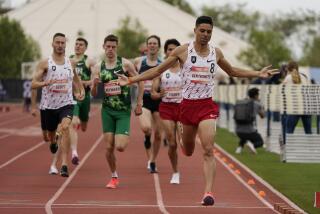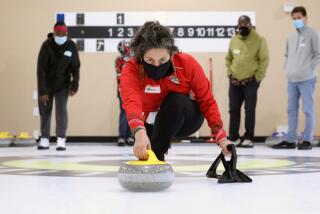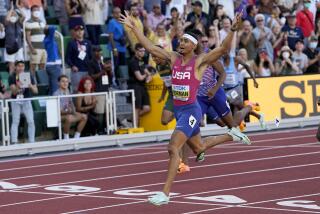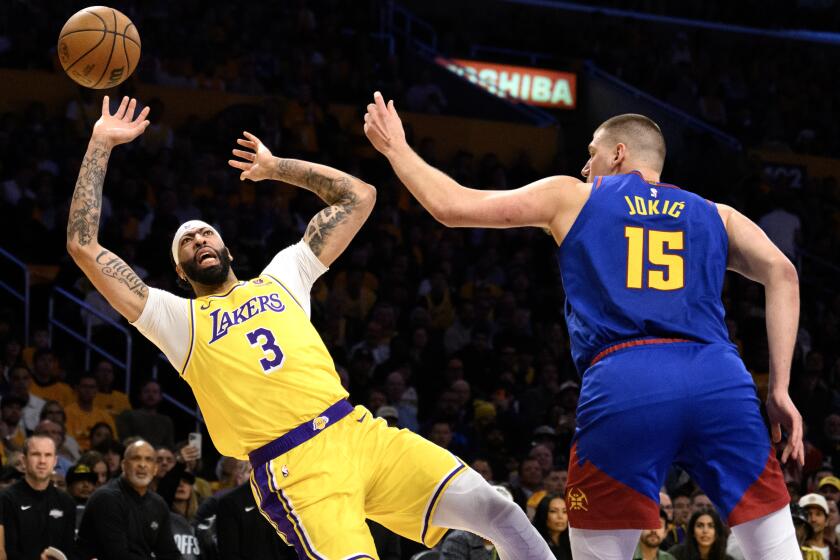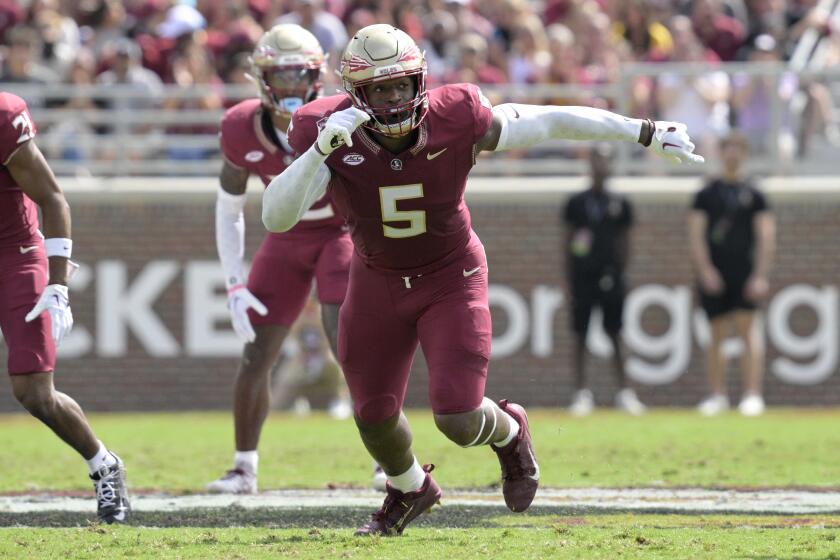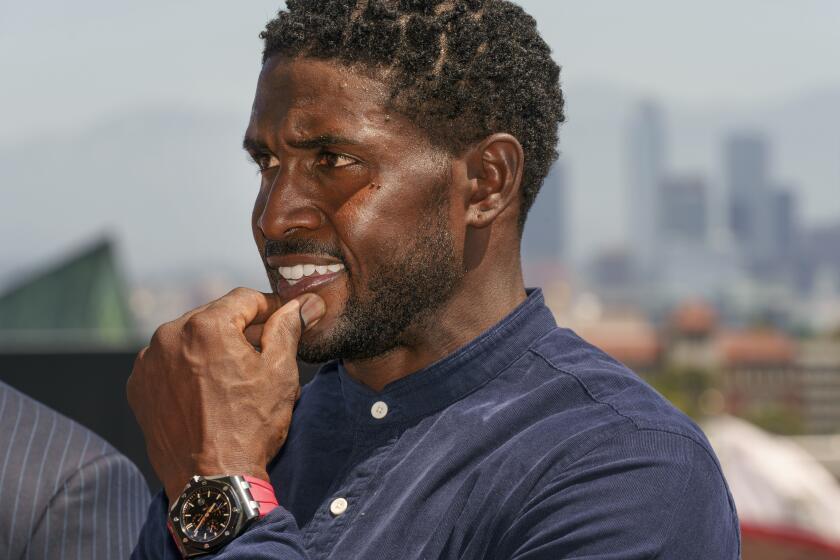Olympic champ Aries Merritt, kidney transplant recipient, defies risk in seeking a berth at Rio
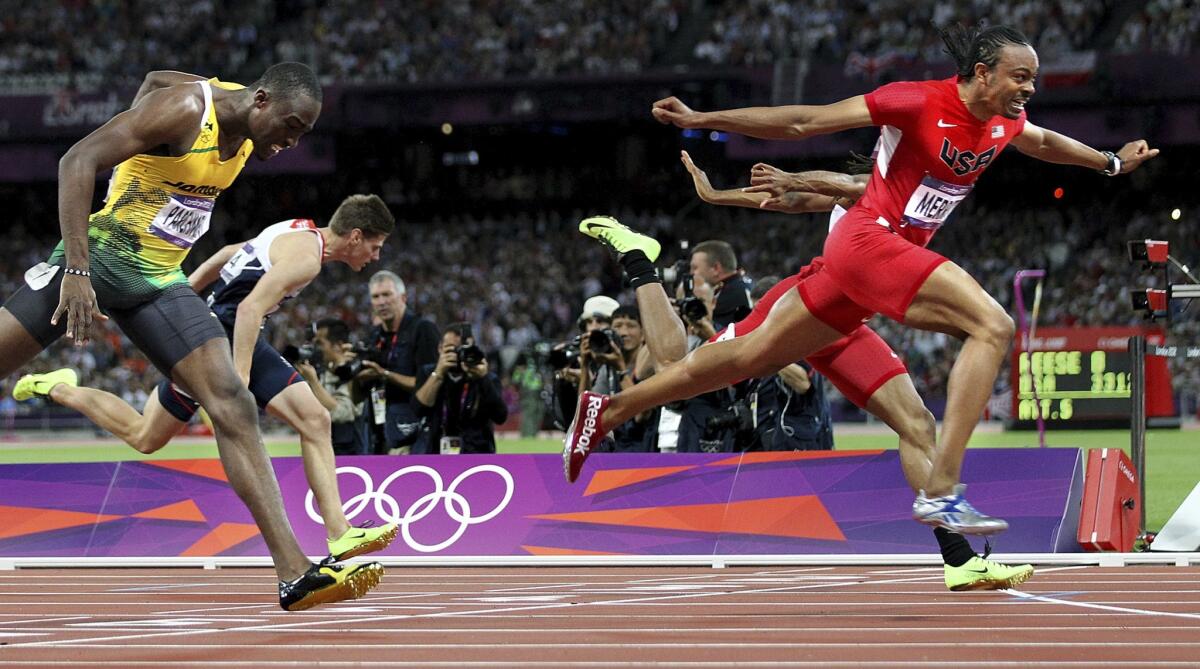
Aries Merritt has every reason to play it safe and turn down a berth at the Rio Games if he finishes in the top three in the 110-meter hurdles at the U.S. Olympic track and field trials. The doctors who extended his life by transplanting a kidney donated by his older sister, LaToya Hubbard, have made it clear they’d prefer him to stay home.
“They’re really concerned about the Zika thing,” he said, because the anti-rejection drugs he must take the rest of his life impair his body’s ability to fight infections. Zika, which hit epidemic stage in Brazil last year, is a blood-borne infection most often transmitted by mosquitoes.
“They’ve asked me many times, ‘Have you considered not going?’” said Merritt, the 2012 Olympic gold medalist as well as the world record holder at 12.80 seconds. “And I’m like, ‘That’s not an option. If I make it, I’m going.’”
His event isn’t for the timid. One misstep or careless brush of a foot against a hurdle can wipe out years of work. “The hurdles are very unforgiving,” he said Wednesday during a break from preparing to begin competition Friday at Hayward Field. “Ten barriers are your worst enemies, not the people that you’re competing against.”
His willingness to accept risk on the track has carried over to his recovery from the transplant — which was performed Sept. 1 near his home, at the Mayo Clinic in Phoenix — and from follow-up surgery in mid-October to address complications.
Is he brave? Foolish? It’s his choice, and he has come down firmly on the side of pursuing another chance to be the best of the best.
“The Olympic Games is just like the Super Bowl for track and field. We don’t compete but once every four years,” said Merritt, who won a bronze medal at the 2015 world championships with his kidney function below 20%. “I think it’s really important to go after that Olympic dream and try to win a gold medal, showing everyone around the world your story and your struggle.”
Other athletes have returned to high-level competition after kidney transplants, among them former NBA standouts Sean Elliott and Alonzo Mourning, who had a disorder called focal segmental glomerulosclerosis. Merritt, whose father’s family has a history of kidney disease, said he had a variant called collapsing FSGS. Knowing there’s precedent is of some help to Merritt, but there isn’t a blueprint he can follow.
“That’s a team sport,” he said. “If you’re not playing to the best of your ability someone else can pick up the slack. This is an individual sport. There’s always somebody younger, always somebody faster.”
He knows the chance he would take if he goes to Brazil, just as he knows not to eat raw food or pomegranates, which interfere with his medication. His doctors told him to wear longer sleeves than usual, use insect repellent and avoid lingering near water, where mosquitoes can breed. Another recommendation will be more difficult for him to obey: Avoid staying outside too long. “It’s outdoors — what am I supposed to do?” he said, smiling.
Still, he’s intent on plowing forward. His fitness level enabled him to jog seven weeks after the transplant, a week early, but the second procedure — which drained a hematoma that was crushing his new kidney and moved it deeper into his body — halted his training for six weeks and ruled out weightlifting for eight weeks. He also strained a groin muscle at the Prefontaine meet in Eugene in late May, sending him to Germany for treatment.
And there are spasms he sometimes feels while muscles that were pulled aside during the transplant and shifted his belly button far to the right side move back to their old position. “It’s normal for me now,” said Merritt, whose original kidneys remain in his body, with the new one in his abdomen. “It hurts but it’s something that I’m dealing with, and next year I won’t deal with that.”
Earning a top-three finish here will be a tough task because Merritt hasn’t run many races this season and lacks competition sharpness. The U.S. is deep in hurdlers; David Oliver, who ran a 13.09 earlier this year, Ronnie Ash (13.18) and NCAA champion Devon Allen (13.32) are prime Rio contenders. Merritt, whose best time this year is 13.24, is as prepared as he can be to get there and can envision how he’d react if he prevails again.
“Winning it the first time was a dream come true, but this time it will definitely be different. It will be a lot more challenging than it was the last time, considering I’m coming off surgery nine months ago,” he said. “But just going out there and winning a medal, given everything I’ve gone through, is going to be huge. And if I was to win it would be ugly because I’d be on the track crying because of all the pain and all the suffering and all the depression I went through to get to this point.”
helene.elliott@latimes.com
Twitter: @helenenothelen
More to Read
Get our high school sports newsletter
Prep Rally is devoted to the SoCal high school sports experience, bringing you scores, stories and a behind-the-scenes look at what makes prep sports so popular.
You may occasionally receive promotional content from the Los Angeles Times.
